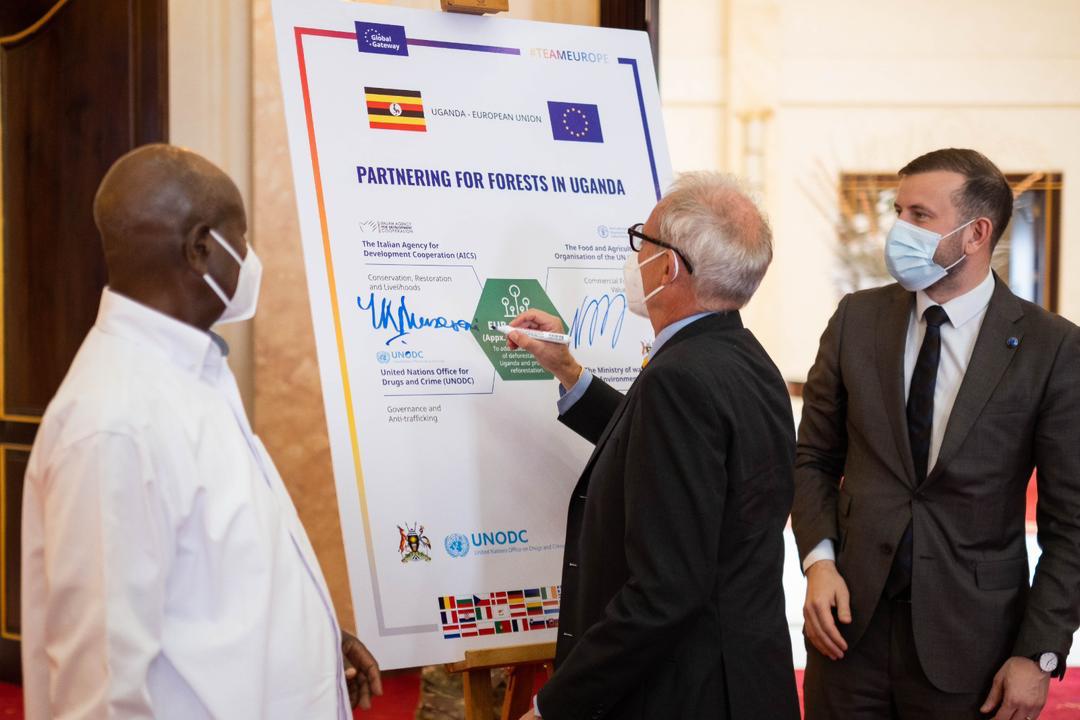Health Ministry issues guidelines for wearing facemasks
Following a directive making it compulsory for everyone to wear facemasks while in the public, the Ministry of Health has issued guidelines for the same.
Addressing journalists on Thursday, the health minister, Dr.Jane Ruth Aceng said there are two types of masks including the medical and non- medical masks and that both are on the Ugandan market.
Keep Reading
- > Museveni, Ramaphosa set to meet for Regional Security talks
- > Museveni warns against hindering Atiak Sugar Factory project
- > Museveni hails Atiak Sugar factory for benefitting Acholi, neighbouring areas
- > Museveni directs the Attorney General to draft legislation prohibiting National ID as loan collateral
“The medical masks include; N95, KN95 and surgical masks whereas the non-medical masks are made out of fabric (cloth). Medical masks should be preserved for health workers in health facilities and are not reusable. Since it is used in a hospital environment, it is highly contaminated by various infectious organisms and its reuse is risky,”Aceng said.
“The community is encouraged to use non-medical masks (masks made out of fabrics e.g. cotton masks.”
The Minister explained the non-medical mask is a two layer cotton mask with a filter material like paper towel or coffee filter or polypropylene (the material often used for non-plastic shopping bags placed between the 2 layers to improve the mask).
She said this material acts as a filter and can be removed before washing.
“Polypropylene is washable and reusable, she added.
The minister added that when a double cloth mask is used with a filter inside, its protectiveness is over 95%.
Who should wear masks?
According to the minister, all adults and children aged six years and above are eligible to wear masks whereas people with breathing difficulties are asked to seek advice from medical personnel before putting on facemasks.
“Children aged 2- 6 years are very active and cannot take care of their masks and observe hygiene. They should only put on masks under close supervision. Children below 2 years should not wear a mask as they have a small lung capacity.”
When to wear masks
According to the Ministry of Health guidelines, when going to public places including work, public transport, markets, supermarkets, shops, classrooms, places of worship and healthcare facilities, facemasks should be put on.
“Masks should be put on when acceptable social distancing is not possible, when one has a cough, cold or sore throat even when at home,” the guidelines say.
“The mask should also be put on when at home and visited by a person who is not part of the household, when in any congested area.”
According to the guidelines, people should not wear masks when running, jogging, or doing other physical activities.
“It is not necessary to wear a mask when you are alone in the car but have it ready in case of another passenger or when you step out,” the Minister said.
How to wear mask
The guidelines stipulate that in order to put on the mask, one has to hold onto the straps or loops and place it over the nose and mouth all the way to the chin.
“Avoid touching the front and inner sides of the mask. The mask should be kept on even when talking. In case of need to remove the mask like for eating or drinking, it should be removed completely by holding on to the straps and folded with the inner side in and placed in a clean container such as an envelope. It may also be hanged on nails and hooks in such a way that it does not touch any surfaces. Wash hands with soap and water or use a hand sanitizer whenever one touches the front or inside of the mask.”
Other guidelines
- Maintain periodic hand hygiene (washing with soap and water or hand sanitizer).
- Maintain a social distance of at least 2 meters.
- Avoid touching the mouth, eyes and the nose.
- Ensure the mask covers the nose, mouth and chin when wearing it.
- Keep the mask hanged in a clean area or in a clean envelope/container when not wearing it
- Wash and dry re-useable fabric (cotton) mask daily.
- Remove the filter before washing the mask.
- If the filter is washable (e.g. polypropylene) wash and dry it separately.
When handling another person’s mask;
- Handle with the knowledge that other people’s masks are potentially infectious.
- Observe hand hygiene after handling masks.
- Ensure that the mask does not come into contact with one’s mouth, eyes or nose.
Don’ts
- Do not pick medical masks that have been disposed.
- Do not share masks even with close family members.
- Do not re-use medical masks
- Do not borrow masks
- Do not buy medical masks from the streets.



















